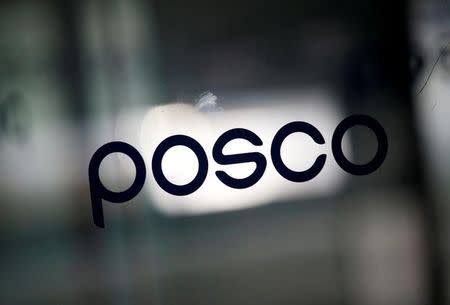South Korea scandal shines light on corporate, government nexus
By Ju-min Park and Hyunjoo Jin SEOUL (Reuters) - Returning from a board meeting of South Korean steel giant POSCO last November, director Bahk Byong-won said he was "dumbfounded" at a decision made there to donate 3 billion won ($2.61 million) to a recently set up non-profit foundation. Bahk said he did not vote against the proposal because he "was told" it had to be approved, according to a transcript of comments he made at a separate closed-door meeting later that day at the Arts Council Korea. He did not specify who told him. "I was not able to vote against it," Bahk was quoted as saying in the transcript, which was read out by an opposition lawmaker in parliament last month, and was confirmed to be accurate by the Arts Council Korea. Prosecutors are now investigating people close to President Park Geun-hye in an influence-peddling case that has transfixed South Korea. An old friend of the president has been charged with abuse of power and fraud while a former aide has been charged with abuse of power and extortion after they helped raise 77.4 billion won ($67.75 million) from dozens of the country's biggest corporate groups on behalf of the two foundations. Park has said she has not personally benefited but tens of thousands of people marched through Seoul on Saturday, demanding she quit. Bahk's comments also shed light on the cozy ties between the government and South Korean conglomerates, known as "chaebol", that have dominated the country's economy for decades. Bahk, who heads the Korea Employers Federation, a major business lobby group, said the government appeared to have "twisted the ankles" of the chaebol, pressuring them to provide large sums of money for the Mir foundation, set up to promote cultural exchanges with other countries. Asked by Reuters if the transcript of his remarks was accurate, Bahk did not answer directly, and declined further comment. The Federation of Korean Industries (FKI), which represents the country's biggest businesses and runs Mir, declined comment on Bahk's remarks. POSCO also declined comment. In the 1980s, the Kukje Group, a conglomerate, refused to make charitable contributions to then-president Chun Doo-hwan's Ilhae Foundation, according to several media reports at the time. Chun subsequently ordered the country's main bank to deny loans to the group, forcing it into bankruptcy, which the country's highest court later ruled was an infringement of Kukje's rights. GOVERNMENT SUPPORT The two foundations that figure in the current case, Mir, or "dragon", and K-Sports, involved in sports-related projects, are both run by the FKI business grouping. They have been given a vote of confidence by Park. "My understanding is the nature of the two foundations is that companies have agreed to set them up to support the area of culture and sports," Park said last month. She said she had asked business leaders in February last year to expand investments in culture and sports and was grateful they had responded. Mir was set up in October last year and K-Sports in January. A prosecution source said that when the former presidential aide An was raising funds, he made clear that a "VIP" was interested in the projects and that the fundraising was for a good cause. The source, who declined to be identified because the matter is under investigation, said the VIP was Park. In remarks to senior advisers that her office later released to media, Park said: "The foundations are said to have been set up for my post-retirement but it is not true. If suspicions about such meaningful projects spread and personal attacks keep happening, it will throw cold water over the companies' pure will to contribute." Officials from several chaebol that include the country's biggest corporates have been questioned in the case although none of the groups have been accused of any wrongdoing. Among those questioned were an executive at Samsung, which donated a total of 20.4 billion won to the two foundations, the most of any conglomerate, as well as executives from the SK and Lotte groups, the senior prosecution official said. The investigators plan to summon executives from other groups that contributed to the foundations, said the official, declining to be identified because the investigation was ongoing. A Samsung Group spokeswoman could not confirm whether the official was questioned by prosecutors but said Samsung will fully cooperate with the investigation. Lotte Group said two group executives were questioned last weekend but declined to provide further comment as the prosecutors' probe is still underway. An SK Group official said a group executive was questioned as a witness regarding allegations that the conglomerate was forced to give donations but declined to provide further details. Chung Sun-sup, CEO of research firm Chaebul.com, said the latest scandal suggests that South Korea still had an "imperial" presidential system. "We still live in an era where if a president says a word, the chaebol line up," Chung said. (Editing by Tony Munroe and Raju Gopalakrishnan)




